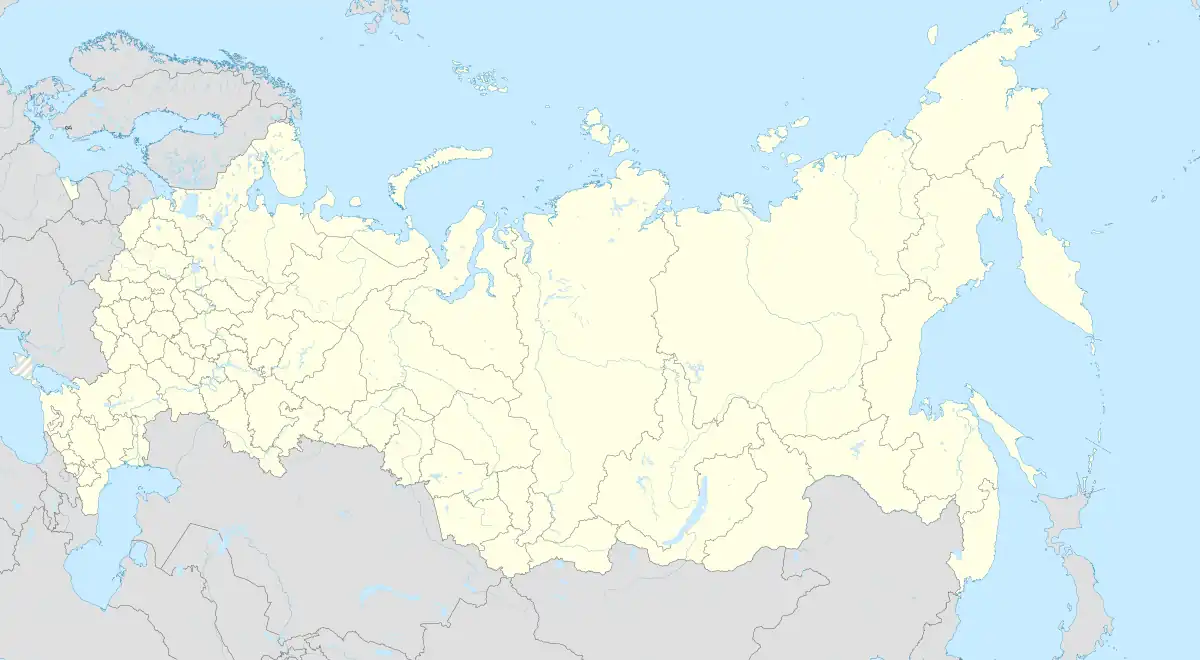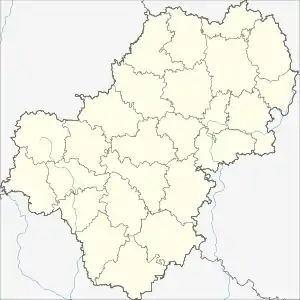Dugna
Dugna (Russian: Дугна́) is an urban locality (a settlement) in Ferzikovsky District of Kaluga Oblast, Russia, located on the left bank of the Dugna River, 18 kilometers (11 mi) from Ferzikovo, on the main rail line between Kaluga and Tula. Population: 667 (2010 Census);[1] 792 (2002 Census);[4] 946 (1989 Census).[5]
Dugna
Дугна | |
|---|---|
Settlement | |
Location of Dugna | |
 Dugna Location of Dugna  Dugna Dugna (Kaluga Oblast) | |
| Coordinates: 54°24′N 36°51′E | |
| Country | Russia |
| Federal subject | Kaluga Oblast |
| Administrative district | Ferzikovsky District |
| Founded | 1709 |
| Population | |
| • Total | 667 |
| • Municipal district | Ferzikovsky Municipal District |
| • Urban settlement | Dugna Urban Settlement |
| • Capital of | Dugna Urban Settlement |
| Time zone | UTC+3 (MSK |
| Postal code(s)[3] | 249811 |
| Dialing code(s) | +7 484 |
| OKTMO ID | 29644403101 |
History
The Dugna Foundry was first mentioned in 1689. The settlement itself was founded in 1709 by Nikita Demidov, who built the first steel mills in Russia. The steel mills were built in 1715 on the site of L. Naryshkin Iron Works, founded in 1690. Now the ironworks are known as Dugna Machine Plant[6]
Having arrived to the region in 1700, Nikita Demidov was well aware of its riches and of the importance of the steel industry for the economy of Russia. With the personal guarantee of Peter the Great, he was one of the pioneers to develop Russian domestic metallurgy and metal production. In the mid-18th century, Dugna, Brynsky, and Vyrovsky plants annually produced 19,000 poods of iron for the local market and additionally exported large quantities to St. Petersburg. Production of iron at these three factories at that time ranged from 40 to 70 thousand poods a year, which corresponded to melting of approximately 60-100 thousand poods of iron.
Dugna was granted urban-type settlement status in 1925.
Places of interest
- Peter & Paul Church (built about 1764)[7]
- Pontoon bridge over the Oka River
- Steel pedestrian bridge over the Dugna River
Gallery
 Center of the settlement, the view on former Demidov's houses used as a school and a library during Soviet times
Center of the settlement, the view on former Demidov's houses used as a school and a library during Soviet times Mechanical factory and a church
Mechanical factory and a church Pedestrian bridge over the Dugna River
Pedestrian bridge over the Dugna River
References
- Russian Federal State Statistics Service (2011). Всероссийская перепись населения 2010 года. Том 1 [2010 All-Russian Population Census, vol. 1]. Всероссийская перепись населения 2010 года [2010 All-Russia Population Census] (in Russian). Federal State Statistics Service.
- "Об исчислении времени". Официальный интернет-портал правовой информации (in Russian). 3 June 2011. Retrieved 19 January 2019.
- Почта России. Информационно-вычислительный центр ОАСУ РПО. (Russian Post). Поиск объектов почтовой связи (Postal Objects Search) (in Russian)
- Russian Federal State Statistics Service (21 May 2004). Численность населения России, субъектов Российской Федерации в составе федеральных округов, районов, городских поселений, сельских населённых пунктов – районных центров и сельских населённых пунктов с населением 3 тысячи и более человек [Population of Russia, Its Federal Districts, Federal Subjects, Districts, Urban Localities, Rural Localities—Administrative Centers, and Rural Localities with Population of Over 3,000] (XLS). Всероссийская перепись населения 2002 года [All-Russia Population Census of 2002] (in Russian).
- Всесоюзная перепись населения 1989 г. Численность наличного населения союзных и автономных республик, автономных областей и округов, краёв, областей, районов, городских поселений и сёл-райцентров [All Union Population Census of 1989: Present Population of Union and Autonomous Republics, Autonomous Oblasts and Okrugs, Krais, Oblasts, Districts, Urban Settlements, and Villages Serving as District Administrative Centers]. Всесоюзная перепись населения 1989 года [All-Union Population Census of 1989] (in Russian). Институт демографии Национального исследовательского университета: Высшая школа экономики [Institute of Demography at the National Research University: Higher School of Economics]. 1989 – via Demoscope Weekly.
- Дугнинский механический завод // rusten.ru
- "Дугна|Церковь Петра и Павла. Фотографии и описание". Sobory.ru. 1917-10-25. Archived from the original on 2012-09-25. Retrieved 2013-10-12.